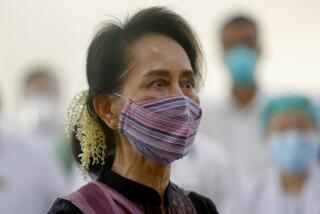Ailing Heart Puts Yeltsin in Hospital
- Share via
MOSCOW — Russian President Boris N. Yeltsin was hospitalized Tuesday for a worsening heart condition, but aides said that his condition was not serious and that the 64-year-old Siberian will spend “not more than a few days” in the hospital.
Yeltsin, who has a history of heart troubles, is reputed to be a heavy drinker and has behaved erratically in public recently. He suffered an “exacerbation of cardiac ischemia,” a Kremlin statement said.
Such ischemia, better known as coronary heart disease, involves a constriction of the blood supply to the heart.
Although Yeltsin was hospitalized at least once before for heart problems, in 1987, this episode appears to be the most serious health setback for the silver-haired leader since he became Russia’s first elected president in 1991. Political analysts said it could pressure Yeltsin not to seek reelection when his term expires in June.
Yeltsin was rushed to the Central Clinical Hospital on Tuesday morning after suffering chest pains at home. But by afternoon, aides said that he was conscious and that the pains had passed. Ivan P. Rybkin, chairman of Parliament’s lower house, reported that Yeltsin was in “satisfactory” condition, and aides insisted that the Russian president will go ahead with a scheduled trip to Norway next Wednesday.
Western physicians said the Kremlin’s health reports were so vaguely worded as to shed little light on the severity of the Russian president’s condition.
“They’re really being coy,” said Dr. George R. Goy, an emergency room specialist at the American-run U.S. Global Health clinic in Moscow. “Ischemia has a broad range. . . . It means the heart is being deprived of oxygen” but gives no clue as to the extent of the problem since the constriction could be partial or complete, he said.
Dr. Manuel Cerqueira, associate chief of cardiology at Georgetown University Medical Center in Washington, observed of the Russian statement: “The way they worded it does imply that he has coronary heart disease. He could have had a heart attack, but maybe he just has angina [chest pain] that needs to be controlled. You just don’t have enough information.”
Although traders on global exchanges reacted with alarm to the Russian president’s illness, as a result bolstering the U.S. dollar, in Moscow the streets and stock markets were calm.
The Russian media gave matter-of-fact but necessarily terse reports on Yeltsin’s condition. The 8 p.m. newscast on state-owned television devoted only 30 seconds to his hospitalization.
Still, that Yeltsin’s illness was promptly announced indicates that the Soviet tradition of news blackouts in the event of a leader’s illness or death has receded. In the most infamous of all Soviet episodes of such “spin” control, Russians got their first hint of the 1982 death of long-ailing Soviet leader Leonid I. Brezhnev when state television changed its regular programming without explanation and began running World War II movies and Beethoven concerts. His death was announced only the following day.
When Brezhnev’s successor, Yuri V. Andropov, disappeared from public view for almost five months, Soviet officials insisted he was in fine health--until they announced his death on Feb. 10, 1984.
Arkady A. Popov of the Presidential Analytical Center said the announcement within hours that Yeltsin had been hospitalized showed a new candor in the Russian leadership and an understanding that to try to hush up the incident would only backfire with rumors and speculation.
“It is just a minor health problem that can be easily cured,” Popov said. “Doctors will inject some medicine into the president’s backside and he will be ready for new feats again.”
Nevertheless, speculation abounded--most of it concerning Yeltsin’s drinking. Yet in a sign of vestigial caution, no Russian journalists spoke the words alcohol or drinking.
Alexander Minkin, a columnist at the Moskovsky Komsomolets newspaper, explained away Yeltsin’s indisposition simply by noting that on Monday there was a birthday party for Sergei A. Filatov, the president’s chief of staff.
Russians are famous for overindulging in birthday toasts.
Yeltsin “has Siberian health. He is healthy enough to be able to cry at our funerals,” Minkin said. “Don’t worry. It is a very temporary problem. The president will be fine tomorrow.”
Cardiologist Cerqueira said it is “possible” that the birthday bash could have triggered Yeltsin’s chest pains.
“There is such a thing as ‘holiday heart syndrome,’ where sometimes people who go on binge drinking may develop irregular heart rhythms, which can precipitate angina in people who have ischemic heart disease,” he said.
Cerqueira said that Yeltsin does have risk factors for coronary heart disease, notably his age, sex and high blood pressure, which he takes unspecified medicines to control.
In an April interview with Time magazine, Yeltsin said he had no particular health worries. “There are fluctuations, of course, in my blood pressure, but the doctors and I are watching this,” he said. “In general, I feel fine.”
According to the Russian constitution, if the president dies in office, he is succeeded by the prime minister, with new presidential elections to be held within three months. Aides said Yeltsin had not transferred his powers to Prime Minister Viktor S. Chernomyrdin, as the president was in full control. But Viktor V. Ilyushin, Yeltsin’s senior aide, said a meeting of the Russian Security Council scheduled for today had been canceled.
At 64, Yeltsin has lived six years beyond the average life expectancy for a Russian male. He has not yet said whether he intends to run for reelection--and no one in Russia expects him to announce until after the parliamentary elections scheduled for December. Chernomyrdin has said he will participate in the presidential elections--as a voter.
But analysts saw Yeltsin’s hospitalization, however mild his illness proves, as boosting Chernomyrdin as a possible presidential successor in 1996. It may also prompt Yeltsin to reconsider retiring and inspire rivals to position themselves for a possible run, said Viktor A. Kremenyuk of Moscow’s U.S.A. and Canada Institute.
“Even his friends will recommend to him, ‘Boris, enough is enough, let’s think about who will replace you,’ ” Kremenyuk said. “This will be the conclusion of both his friends and his enemies.”
Yeltsin’s popularity ratings remain mired in the single digits; peace talks in the breakaway republic of Chechnya have yet to produce tangible results, and Yeltsin sacrificed three of his closest ministers last month to beat back a no-confidence motion by Parliament.
Yet time and again, Yeltsin has performed best just when he appears to have been beaten. And Yeltsin has a history of vindictiveness toward those who cross him, from his former boss Mikhail S. Gorbachev to his former running mate, Alexander V. Rutskoi.
More to Read
Sign up for Essential California
The most important California stories and recommendations in your inbox every morning.
You may occasionally receive promotional content from the Los Angeles Times.










